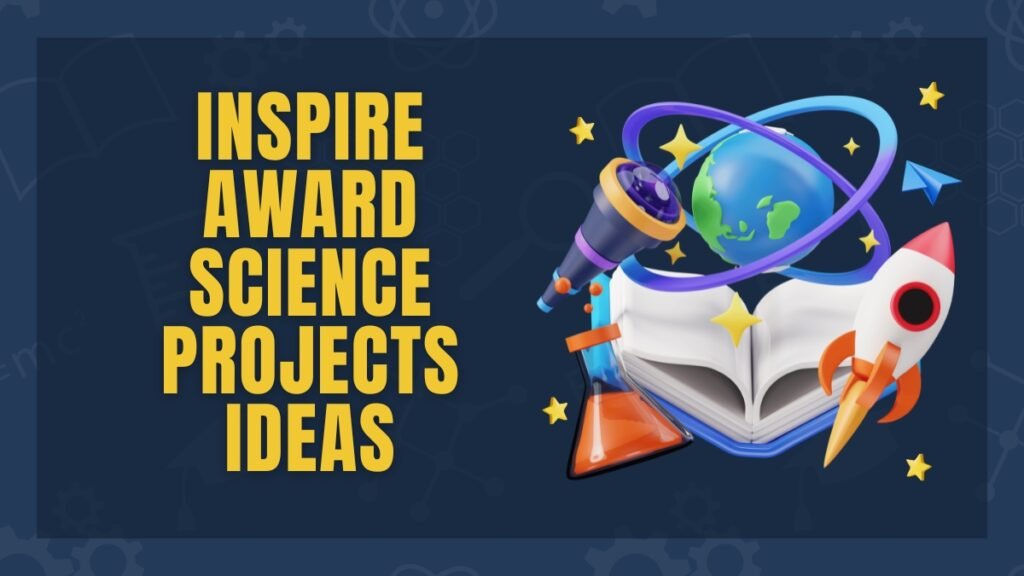Unlock your scientific potential with the Inspire Award Science Projects Ideas! Discover creative and engaging science project ideas, tips, and inspiration to help you create standout projects and shine in your science fair.
Got a passion for science? The Inspire Award is your chance to show off your best science project! We’re looking for creativity and cool ideas.
Not sure where to begin? No problem! This blog will help you create a standout project that gets noticed and makes science fun.
Ready to dive in? Let’s make science awesome!
What is the Inspire award in science?
The INSPIRE Award, part of the MANAK program by the Department of Science and Technology (DST), aims to spark creativity and innovation in school students. It encourages original science-based ideas and real-world applications.
By celebrating standout projects, the INSPIRE Award motivates students to explore their scientific potential and consider careers in science and research.
Inspire Award Science Projects Ideas PDF
Importance of science projects for students
Science projects offer students many benefits:
| Aspect | Description |
|---|---|
| Hands-on Learning | Makes abstract ideas tangible. |
| Problem-Solving | Develops skills to tackle and solve problems. |
| Critical Thinking | Enhances logical reasoning and analysis. |
| Creativity | Encourages innovative and unique solutions. |
| Communication | Improves public speaking and presentation skills. |
| Confidence | Builds self-esteem through project success. |
| Curiosity | Sparks a love for exploration and discovery. |
These projects help set a strong foundation for future academic and career success.
Benefits of participating in the Inspire Award
Participating in the Inspire Award offers:
| Benefit | Description |
|---|---|
| Financial Reward | Supports further scientific exploration. |
| Recognition | Boosts confidence and prestige. |
| Exposure | Present your project at various levels. |
| Mentorship | Get insights and support from experts. |
| Skill Growth | Improve problem-solving, critical thinking, and communication. |
| Career Inspiration | Spark interest in STEM fields. |
| Societal Impact | Address real-world problems. |
Students gain skills and contribute to scientific progress.
Understanding the Inspire Award Criteria
Understanding the inspire award criteria:-
Key Areas of Focus
- Innovation: Original and novel approach.
- Creativity: Unique and imaginative ideas.
- Problem-Solving: Address real-world challenges.
- Scientific Rigor: Follow scientific methods.
- Impact: Positive societal difference.
Age-Appropriate Expectations
- Elementary: Basic concepts and experimentation.
- Middle: Complex ideas and deeper research.
- High School: Advanced research and practical applications.
Judging Criteria
- Originality: Uniqueness of the idea.
- Scientific Method: Adherence to principles.
- Problem-Solving: Effectiveness of the solution.
- Impact: Benefit to society.
- Presentation: Clarity and effectiveness.
For the latest details, refer to the official INSPIRE Award guidelines.
Inspire Award Science Projects Ideas
Check out inspire award science project ideas:-
Environmental Science
- Plastic Degradation: Test methods to break down plastic waste faster.
- Green Spaces Impact: Measure how parks affect city temperatures and air quality.
- Water Filter Design: Create a simple water filter using common materials.
- Pollution Sensors: Build a basic device to measure air or water pollution.
- Biodiversity Study: Compare plant and animal life in urban vs. rural areas.
- Renewable Energy: Test efficiency of solar vs. wind energy.
- Soil Erosion: Experiment with different materials to prevent soil erosion.
- Microplastics: Measure microplastics in local water sources.
- Climate Effects: Study how weather changes affect local crops.
- Insulation Materials: Test which materials best insulate buildings.
Biology
- Microbiome Diversity: Compare microbes in different soil samples.
- Genetically Modified Plants: Test how genetic changes affect plant growth.
- Animal Behavior: Observe how environmental changes impact animal behavior.
- Pollination Efficiency: Compare how different insects pollinate plants.
- DNA Variations: Study genetic differences in local populations.
- Microbial Energy: Explore how microbes can generate electricity.
- Invasive Species: Assess how invasive plants affect local wildlife.
- Antibiotic Production: Grow bacteria to produce and test antibiotics.
- Brain Exercise: Test how puzzles affect learning and memory.
- Photosynthesis: Improve plant growth by optimizing photosynthesis conditions.
Physics
- Renewable Energy: Compare solar and wind power efficiency.
- Quantum Dots: Test how quantum dots improve electronics.
- Acoustic Levitation: Use sound waves to levitate small objects.
- Solar Panel Efficiency: Test different designs for better solar panels.
- Magnetic Levitation: Experiment with magnetic levitation techniques.
- Thermal Conductivity: Test materials for heat insulation.
- Wireless Power: Create a simple wireless power transfer system.
- Fluid Dynamics: Study how fluids flow in natural systems.
- Electromagnetic Fields: Explore effects of electromagnetic fields on devices.
- Particle Properties: Investigate subatomic particles and their behaviors.
Chemistry
- Eco-Friendly Chemicals: Create safe alternatives to harmful industrial chemicals.
- Battery Materials: Develop batteries from sustainable materials.
- Chemical Catalysts: Test new substances to speed up chemical reactions.
- Space Chemistry: Study how chemicals react in microgravity.
- Biodegradable Plastics: Make plastics that break down naturally.
- Drug Synthesis: Experiment with creating new pharmaceutical compounds.
- Water Testing: Build a simple kit to test water quality.
- Nanomaterials: Explore uses of nanomaterials in technology.
- Forensic Analysis: Develop methods to identify substances in forensics.
- Reaction Rates: Study factors affecting the speed of chemical reactions.
Engineering
- Smart Home Tech: Build a basic smart home system for energy efficiency.
- Assistive Robot: Design a robot to help with simple tasks.
- Sustainable Materials: Test new building materials for eco-friendliness.
- Autonomous Vehicle: Create a small robot that navigates autonomously.
- Energy Integration: Model how to add renewable energy to existing systems.
- Disaster Robot: Develop a robot for disaster relief scenarios.
- Wearable Tech: Design a wearable device to track health metrics.
- 3D Printing: Experiment with new materials for 3D printing.
- Structural Monitoring: Build a system to check the health of structures.
- Assistive Tech: Create technology to help people with disabilities.
Astronomy
- Exoplanet Search: Develop methods to find exoplanets.
- Space Debris: Propose ways to track and manage space debris.
- Light Pollution: Study how light pollution affects wildlife.
- Asteroid Mining: Explore concepts for mining asteroids.
- Star Life Cycles: Study different stages in the life of stars.
- Cosmic Background: Analyze cosmic microwave background radiation.
- Space Weather: Examine how solar flares affect Earth.
- Galactic Maps: Create a map of our galaxy or others.
- Dark Matter: Investigate ways to detect dark matter.
- Space Habitat: Design a model for a space habitat.
Health and Medicine
- Wearable Health Monitor: Create a device to track health metrics.
- Fight Antibiotic Resistance: Test methods to combat resistant bacteria.
- Mental Health App: Develop an app to monitor mental health.
- Biomaterials for Implants: Test new materials for medical implants.
- Telemedicine System: Create a system for remote medical consultations.
- Food Analysis: Analyze nutritional content of different foods.
- Genomic Medicine: Explore personalized medicine based on genetics.
- Vaccine Effectiveness: Study how different vaccines prevent diseases.
- Disease Spread Models: Model how diseases spread and propose solutions.
- Biomedical Devices: Design a new device for medical diagnostics.
Inspire Science Project Ideas by Grade Level
Check out Inspire Science project ideas based by grade level:-
Elementary School
Environmental Science
- Plastic Impact: How plastic affects ocean animals.
- Water Conservation: Methods to save water.
- Renewable Energy Models: Simple solar or wind models.
Health and Nutrition
- Balanced Diet: Importance of eating a balanced diet.
- Junk Food Effects: Impact of junk food on health.
- Dental Hygiene: Effectiveness of different brushing techniques.
Physics and Engineering
- Simple Machines: Levers, pulleys, and wheels.
- Building Structures: Construct with blocks or spaghetti.
- Electrical Circuits: Simple circuits to light a bulb.
Middle School
Biology
- Plant Growth: How different conditions affect plants.
- Animal Behavior: Observing pet or wildlife behavior.
- Microbiology: Growing and identifying microbes.
Chemistry
- Chemical Reactions: Basic reactions with common chemicals.
- Water Purification: Simple water filters.
- pH Levels: Testing pH of various liquids.
Physics
- Optics: Light bending through lenses.
- Sound Waves: How sound travels through materials.
- Electricity: Building basic circuits.
Engineering
- Robotics: Basic robot building and programming.
- Bridge Building: Strength tests with popsicle sticks.
- Aerodynamics: Testing different paper airplanes.
High School
Biotechnology
- DNA Extraction: Extracting DNA from fruits.
- Genetic Engineering: Basics and ethics of gene modification.
- Biofuels: Testing biofuels from organic materials.
Environmental Science
- Air Pollution: Measuring air pollutants.
- Water Pollution: Sources and cleanup methods.
- Climate Change: Local effects of climate change.
Physics
- Electronics: Building simple circuits.
- Renewable Energy: Testing solar or wind systems.
- Nuclear Physics: Basics of nuclear reactions.
Computer Science
- AI Models: Simple AI tasks.
- Data Analysis: Finding patterns in data.
- Robotics: Programming robots for tasks.
Project Presentation Tips
Check out the best project presentation tips:-
Creating an Engaging Display
- Visuals: Use clear, eye-catching images and graphs.
- Organization: Structure info logically.
- Interactivity: Add hands-on or interactive elements.
Effective Communication Skills
- Clarity: Explain simply, avoid jargon.
- Storytelling: Build a captivating narrative.
- Confidence: Show enthusiasm and practice.
- Rehearse: Practice your presentation multiple times.
Answering Judge Questions
- Listen: Understand the question before answering.
- Be Clear: Give direct, simple answers.
- Show Knowledge: Display understanding of your project.
- Stay Calm: Keep composure under pressure.
Additional Tips
- Time: Fit your presentation within the time limit.
- Visual Aids: Use slides or posters, but don’t rely solely on them.
- Engage: Make eye contact with judges.
- Prepare: Anticipate questions and practice responses.
Overcoming Challenges
Check out overcoming challenges:-
Common Challenges
- Time Management: Balancing tasks.
- Research Issues: Finding reliable info.
- Experimental Failures: Unexpected results.
- Lack of Motivation: Losing interest.
- Fear of Failure: Hesitating to try new things.
Overcoming Challenges
- Schedule: Break tasks into smaller steps.
- Resources: Use libraries and online tools.
- Learn from Failures: View setbacks as lessons.
- Seek Support: Get help from teachers and peers.
- Set Goals: Keep goals manageable.
- Celebrate Wins: Acknowledge progress to stay motivated.
Additional Resources
Check out additional resources:-
Online Resources
- Science Websites: Science News for Students, NASA Space Place, National Geographic Kids
- Educational Platforms: Khan Academy, Coursera, edX
- Research Databases: Google Scholar, PubMed, JSTOR
- Science Kits and Supplies: Amazon, STEM stores
Local Resources
- Schools and Libraries: Books, equipment, and expert help
- Science Centers and Museums: Interactive exhibits and workshops
- Universities and Research Institutions: Potential mentors or collaborators
- Local Science Clubs: Networking and support
Mentorship and Guidance
- Teachers: Get feedback and advice from science teachers
- Scientists and Researchers: Connect with field professionals
- Online Forums: Join science-related discussions
Using these resources will help improve research and increase the chances of a successful science project.
What to do for Inspire award?
Check out what to do for inspire award:-
Identify a Problem
- Look for issues around you or in your community.
- Focus on problems that science and technology can solve.
Brainstorm Ideas
- Come up with various solutions.
- Explore different approaches.
- Involve friends, family, or teachers in brainstorming.
Select the Best Idea
- Choose an idea based on feasibility, impact, and originality.
- Pick something that matches your interests and skills.
Conduct Research
- Collect information about the problem and possible solutions.
- Explore related scientific concepts.
- Get advice from experts or mentors.
Develop a Prototype
- Create a model or prototype of your solution.
- Test and refine your idea.
- Document your process and results.
Prepare a Presentation
- Make a clear, engaging presentation.
- Explain the problem, solution, and process.
- Practice to build confidence.
Submit Your Entry
- Follow the INSPIRE Award guidelines.
- Include all required documents.
- Submit before the deadline.
Focus on originality, creativity, and real-world problem-solving for a successful INSPIRE Award project.
Interview with a past Inspire Award winner
Here are some concise questions to ask a past Inspire Award winner:
About Their Project
- Inspiration: What inspired your project?
- Challenges: How did you handle challenges?
- Reward: What was the best part?
- Balance: How did you manage school and your project?
About the Inspire Award Experience
- Application: What was the application process like?
- Preparation: How did you prepare for the presentation?
- Advice: Any tips for current participants?
- Impact: How has winning the award affected you?
Lessons Learned
- Takeaways: What did you learn?
- Skills: How did the award help you grow?
- Resources: Advice for students with few resources?
Future Aspirations
- Plans: What are your future plans?
- Skill Use: How will you use what you learned?
- Career Advice: Tips for aspiring scientists?
These questions will help you get clear and useful insights from a past winner.
Showcase of winning projects
Here’s a simplified guide to showcasing winning Inspire Award projects:
Online Platforms
- Website: Create a site with project details, images, and videos.
- Social Media: Share highlights on Instagram, Facebook, and YouTube.
- Interactive Galleries: Include quizzes or polls on online galleries.
Physical Exhibitions
- Science Fairs: Display projects at science fairs.
- School Events: Show projects during school open houses.
- Community Events: Partner with local groups for exhibitions.
Media Coverage
- News Articles: Work with local media to feature projects.
- Documentaries: Make short films about the winning projects.
- Press Releases: Send out releases to attract media attention.
Awards and Recognition
- Certificates/Trophies: Give tangible rewards to winners.
- Scholarships/Internships: Offer further learning opportunities.
- Mentorship: Connect winners with experienced mentors.
These methods can help inspire future students and showcase innovation.
Tips for parents and teachers
Here’s a more concise version:
For Parents
- Encourage Exploration: Offer hands-on experiments.
- Support Curiosity: Answer questions and nurture interest.
- Create a Learning Space: Set up a spot for projects.
- Attend Events: Visit science fairs and exhibits.
- Celebrate Achievements: Praise their efforts.
For Teachers
- Engage Curriculum: Make science fun.
- Promote Problem-Solving: Encourage real-world solutions.
- Foster Collaboration: Support group work.
- Provide Mentorship: Guide their projects.
- Encourage Experimentation: Allow for trial and error.
These steps help inspire a love for science and boost participation in the Inspire Award.
Conclusion
The Inspire Award is a great opportunity to ignite your passion for science. It encourages creativity and problem-solving, helping you become a future scientist or leader. Every great discovery starts with curiosity.
So, jump into science, experiment, and let your imagination run wild. With hard work and creativity, your project can really stand out. Let your curiosity drive you on this exciting adventure!


